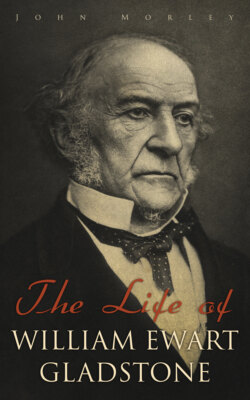Читать книгу The Life of William Ewart Gladstone - John Morley - Страница 52
На сайте Литреса книга снята с продажи.
VI
MENTAL GROWTH
ОглавлениеOnce more, his whole temper and spirit turned to practice. His thrift of time, his just and regulated thrift in money, his hatred of waste, were only matched by his eager and minute attention in affairs of public business. He knew how to be content with small savings of hours and of material resources. He was not downcast if progress were slow. In watching public opinion, in feeling the pulse of a cabinet, in softening the heart of a colleague, even when skies were gloomiest, he was almost provokingly anxious to detect signs of encouragement that to others were imperceptible. He was of the mind of the Roman emperor, 'Hope not for the republic of Plato; but be content with ever so small an advance, and look on even that as a gain worth having.'127 A commonplace, but not one of the commonplaces that are always laid to heart.
If faith was one clue, then next to faith was growth. The fundamentals of Christian dogma, so far as I know and am entitled to speak, are the only region in which Mr. Gladstone's opinions have no history. Everywhere else we look upon incessant movement; in views about church and state, tests, national schools; in questions of economic and fiscal policy; in relations with party; in the questions of popular government—in every one of these wide spheres of public interest he passes from crisis to crisis. The dealings of church and state made the first of these marked stages in the history of his opinions and his life, but it was only the beginning.
I was born with smaller natural endowments than you, he wrote to his old friend Sir Francis Doyle (1880), and I had also a narrower early training. But my life has certainly been remarkable for the mass of continuous and searching experience it has brought me ever since I began to pass out of boyhood. I have been feeling my way; owing little to living teachers, but enormously to four dead ones128 (over and above the four gospels). It has been experience which has altered my politics. My toryism was accepted by me on authority and in good faith; I did my best to fight for it. But if you choose to examine my parliamentary life you will find that on every subject as I came to deal with it practically, I had to deal with it as a liberal elected in '32. I began with slavery in 1833, and was commended by the liberal minister, Mr. Stanley. I took to colonial subjects principally, and in 1837 was commended for treating them liberally by Lord Russell. Then Sir R. Peel carried me into trade, and before I had been six months in office, I wanted to resign because I thought his corn law reform insufficient. In ecclesiastical policy I had been a speculator; but if you choose to refer to a speech of Sheil's in 1844 on the Dissenters' Chapels bill,129 you will find him describing me as predestined to be a champion of religious equality. All this seems to show that I have changed under the teaching of experience.
And much later he wrote of himself:—
The stock in trade of ideas with which I set out on the career of parliamentary life was a small one. I do not think the general tendencies of my mind were even in the time of my youth illiberal. It was a great accident that threw me into the anti-liberal attitude, but having taken it up I held to it with energy. It was the accident of the Reform bill of 1831. For teachers or idols or both in politics I had had Mr. Burke and Mr. Canning. I followed them in their dread of reform, and probably caricatured them as a raw and unskilled student caricatures his master. This one idea on which they were anti-liberal became the master-key of the situation, and absorbed into itself for the time the whole of politics. This, however, was not my only disadvantage. I had been educated in an extremely narrow churchmanship, that of the evangelical party. This narrow churchmanship too readily embraced the idea that the extension of representative principles, which was then the essential work of liberalism, was associated with irreligion; an idea quite foreign to my older sentiment on behalf of Roman catholic emancipation. (Autobiographic note, July 22, 1894.)
